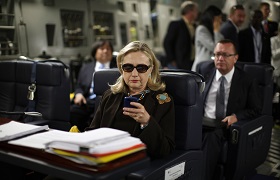
www.imprenditori.it
Facebook turned 10 in early February 2014. In what way have social media changed how people live and how states operate? What has happened to public diplomacy in social media in general and in Facebook in particular? What trends are we seeing in digital diplomacy?
Definitions
First, it seems sensible to make sure we are clear about the subject under analysis, which appears obvious but in reality is not so straightforward.
In order to simplify this task, we will use the term digital diplomacy, covering the digital environment, the Internet, as well as the information and communications technologies as a whole. Experts and journalists sometimes refer to internet diplomacy, online diplomacy, e-diplomacy, and cyber-diplomacy. Many prefer network media-related definitions such as twitter diplomacy or Facebook diplomacy simply to underline the importance these particular networks have for public diplomacy.
Experts once dated the emergence of digital diplomacy as potent tool in U.S. foreign policy.
Notably, in both terminology and practice different phenomena and areas of public diplomacy are interwoven in the digital environment. Sometimes they mutate and influence each other in a highly intricate way. Social media-based interaction takes place at three levels: technological – the development and evolution of social platforms; civil – the engagement and participation of people; and political – the employment of technologies and media to influence people who engage in social interaction in the digital space. Social networks are becoming increasingly involved in the dissemination of political information, its main feature being dialogue as the key form of contact with the audience and almost immediate feedback.
Digital diplomacy can directly influence events and people abroad, bypassing not just media filters but also sovereign and international law, enabling the actor to establish the rules of the game, significantly alter the information scene, and set the agenda.
Digital Diplomacy’s Origins
The key channels for the realization of digital diplomacy strategies are the digital social environment, which works as a conductor, and social platforms, which are employed as direct tools in international politics, in a broad sense, including diplomacy.
Experts once dated the emergence of digital diplomacy as potent tool in U.S. foreign policy to the first term of President Obama, when it became clear that social media offer direct contact with a seemingly unlimited number of people, irrespective of their location. It fits well into the concepts of soft power and smart power, an extension of soft power suggested by Hillary Clinton. Since 2009 these instruments have become intrinsic parts of U.S. foreign policy, in particular the 21st Century Statecraft program.
There is factual proof of the program’s efficiency. While Ms. Clinton inherited the official DoS webpage from her predecessor, in February 2013 she armed John Kerry with an impressive Internet tool boasting a total audience (including accounts and blogs) of 20 million, visiting over 300 pages on Facebook, as well as sections of YouTube, Tumblr and Flickr in 11 languages. The system is coordinated by about 150 State Department staffers and 900 specialists outside the U.S. Predictably, Washington is far ahead of all other actors in the digital diplomacy game.
Facebook and Twitter seem the most politicized international social platforms, as can be seen from the number of accounts and communities of politicians and organizations, including those that are state officials and those that are community-based. Another key information dissemination channel is Youtube.
Networked by Americans
Facebook has managed to convert many of its users into permanent online residents, hooked on mobile devices. Users perceive social media as part of their life.
In developing Facebook, it is unlikely that Mark Zuckerberg meant it to become a political tool. Although the official mythology maintains that the developers had great visionary plans, the original concept must surely have been more modest.
Facebook has managed to convert many of its users into permanent online residents, hooked on mobile devices. Users perceive social media as part of their life and are prepared to spend their core irreplaceable resource. Recently, Time Magazine launched an application to calculate how much time you spend on Facebook. This means that seamless access to the user exists practically nonstop, and prompt responses from huge audiences have the potential to change the political map of the world, as demonstrated by the Arab Spring.
Only a decade ago one could not imagine Internet-based politics and diplomacy having such a massive impact on these numbers of people, not least because in 2004 the leader was MySpace, an idiosyncratic product designed as a place where musicians and artists can express themselves – rather than as any kind of communication link between regular people.
In fact, digital diplomacy programs emerged during the presidency of George Bush Jr. in 2002-2003, when radio and TV broadcasting also embraced the Internet, hungry for rapid audience engagement. In 2006, Condoleezza Rice, then secretary of state, set up the Digital Outreach Team to monitor and analyse U.S.-originated information in social media, and launched Dipnote, the official blog of the U.S. Department of State. The government portal America.gov was also established (currently visitors are redirected to the IIP site and some e-media intended for the dissemination of positive information about the United States).
Digital diplomacy blossomed in January 2009, when Ms. Clinton came to head the State Department, which not only runs open and public programs but also oversees discreet foreign projects to train Internet activists and set up communities and technological platforms beyond the reach of the authorities. Americans justify these activities by referring to ideals such as truth, justice and democracy, as well as by the need to overcome censorship, while critics regard digital diplomacy as interference in domestic affairs. Hence, since early 2010s, Russia has seemed increasingly concerned about the need to build domestic cybersecurity programs that also cover social media.
Social Media’s Roots in Russia
However, Facebook-based communication as it is, even utterly radicalized, is scarcely able to generate the necessary conditions for drastic changes in public opinion or massive protest marches.
In order to comprehend the environment in which Facebook and other foreign networks exist in Russia, it would be wise to recall the blog hosting site LiveJournal.com that sprang to life in 1999 to become Russia’s first popular social networking service. Over time it has grown to be a major factor in both domestic policies and public discussions. In 2007, Russian company SUP bought it from the U.S. Six Apart, and, despite pessimistic predictions, LiveJournal remains a major supplier of content for Facebook and is among the Top 10 websites of the Russian Internet.
There were several remarkable events in 2006. Twitter emerged, and in Russia two new social networks launched – Odnoklassniki (March) and VKontakte (October). The latter largely seemed a Facebook clone, both in design and operation, but over time became an original platform, currently the most popular in Russia. In summer 2008, Facebook delivered a Russian-language interface.
Speaking in the Russian Foreign Ministry in July 2012, President Vladimir Putin seemed displeased by information and ideological operations on the Internet and the absence of inroads in digital diplomacy, which pushed state bodies, primarily the Foreign Ministry, to boost their presence in social media and the Internet as a whole.
Today, the Foreign Ministry runs about 70 Twitter accounts (the most popular being @MID_RF, which has more than 210,000 subscribers, a YouTube channel (over 2,000 subscribers and over 380,000 views), and a Facebook account (more than 13,500 subscribers). As a result, Russia now ranks 13th in the Agence France Press (AFP) digital diplomacy rating. Interestingly, Russia’s Foreign Ministry has neither a special digital diplomacy unit nor social media professionals.
Facebook Diplomacy: Threat, Opportunity or Myth?

Pavel Sharikov:
Information Deterrence: Transformation of
the Strategic Stability Paradigm
Despite global coverage and vast capabilities, Facebook is far from omnipotent. It is effective for information dissemination, image creation and agenda setting, and also for gathering and mobilizing crowds. However, Facebook-based communication as it is, even utterly radicalized, is scarcely able to generate the necessary conditions for drastic changes in public opinion or massive protest marches.
Modern social networks are rather effective indicators of the public sentiment or mood. The offline preparation of infrastructure and activists remains more efficient, although these activists may then later go on to serve as online links with other likeminded individuals.
Therefore, Facebook diplomacy alone is more of an opportunity to bolster one’s positions and try out various hypotheses. It can also be used in the long-term cultivation of public opinion, alongside other public policy/ diplomacy tools.
Moreover, some researchers, including experts at Princeton University, predict that by 2017 Facebook is going to lose 80 percent of users. For fairness’s sake, the same methodology might as well forecast the demise of Princeton by 2021 or the total depletion of the atmosphere by 2060.
Digital Diplomacy, the Internet, and Social Media: What Next?
It appears obvious that technological development outstrips their introduction and uptake. Hence, alongside technical progress and its driving forces, we also observe a rise in cultural technologists, who give these inventions practical applications and social meaning. Consequently, socio-technological solutions develop uses in various areas, including public policy and digital diplomacy. Therefore, the most rational approach would include monitoring hot inventions and the public response to them, and producing forecasts on other segments.
Facebook diplomacy alone is more of an opportunity to bolster one’s positions and try out various hypotheses.
Facebook, the birthday boy, is not likely to run into trouble in the foreseeable future. Despite the various nay-sayers, it has become a fact of today’s social interaction, with no force in the offing to break the social inertia that keeps it in its key position. The Facebook team is continuously improving the system and will surely seek to prevent the further outflow of the younger generations. Besides, the rising star Instagram is Facebook property, which means they could be as well integrated. Twitter, another major digital diplomacy tool, is also on the upward spiral and is gaining importance as a source of feedback and instant response. Experts at Social MediaWeek-2013 are of the same the opinion, indicating that Facebook and Twitter diplomacy are far from doomed, and are, in fact, set to thrive.
With forms of communication increasingly personalized and varied, personal blogs and social media accounts are becoming more popular, especially if they are vibrant, use clear language, and have room for both stories and photos.
Social news services whose participants rank the news and submit their own information are another clear winner. The year 2013 saw new mass media formats combining traditional editing and social mechanisms burst onto the scene, such as Buzzfeed and HuffingtonPost, which both seem to have a bright future. They are likely to attract political and diplomatic actors, and the HuffingtonPost already posts key politicians’ blogs, including President Obama.
Changes to system and platform are followed by altered data presentation formats. Thanks to developing self-publication services such as medium.com, long stories and blogs are also getting their second wind. The scrollkit.com-type services make visual and interactive narrations on a par with the NYT’s project Snowfall possible. These stories are enhanced with illustrations, multimedia, and interactive features, so that, properly applied, this tool could change the images people have of each other and of entire countries.
Due to the growing interest in the visual component, one obvious trend lies in expanding visual networks and applications, both static (Pinterest, Instagram) and video (Youtube, Vine video format in Twitter, video in Instagram, and coub.com in Russia). Recently, the BBC has launched Instafax short-form video news on Instagram, already tagged a new news presentation format.
As for Russia, the Internet and social platforms are falling under stricter state regulation. Recently, VKontakte, the largest social network in the country, saw ownership and senior management changes. On February 1, a law came into effect allowing the Federal Telecom Supervision Service to block websites containing offensive or illegal material without first obtaining a court ruling, which generates certain grounded fears about the disproportionate use of this power, or its abuse, by various groups.
If plans regarding broadband access are realized by 2020, the Internet will become available to 85 percent of Russia’s population, essentially engaging practically all adults in this interactive media communication. Russia should, by then, have formed a body of digital diplomacy professionals and drastically improved the overall civil and intellectual potential of the medium.
Moscow is allocating 275 million rubles for electronic democracy this year, i.e. 2.5-fold more than in 2013. Such targeted cash infusions should help improve media literacy as a whole and bear fruit in the foreseeable future.
Digital diplomacy and other kinds of interactive political communication do have a bright future, since the appearance of new digital developments and new social and communication practices are a day-to-day reality.
As 13th in the AFP e-diplomacy rating, Russia has seen both diplomatic successes and fragile achievements, which means there is clearly room for improvement both in terms of digital diplomacy and Internet technologies. There is also, definitely, the right environment for this, both technical and intellectual.
Maxim KornevPhD in Philology, Associate professor, Mass-Media Institute, Russian State University for the Humanities, RIAC Expert
http://russiancouncil.ru/en/inner/?id_4=3100#top
















